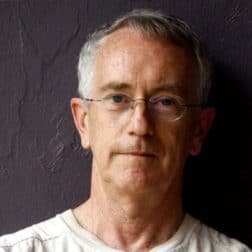“The New Economics: A Manifesto”
19/January/2022
10 am CET
PLACE
Zoom
LANGUAGE
Englisch
Even 15 years after the outbreak of the Great Financial Crisis, economists are finding it difficult to incorporate the risk of renewed turbulence into their standard models. Few were as quick to criticize this as economist and author of the popular book “Debunking Economics” Steve Keen. Now Steve has written a new book that critiques mainstream economics – and proposes a different model that could also help better address challenges like climate change.
Steve Keen presented and discussed what his new model entails in our New Economy Short Cut with Ann Pettifor and Peter Bofinger. We have summarized the highlights.

Steve Keen
Steve Keen is Associate Professor of Economics & Finance at the University of Western Sydney, and author of the books “The New Economics: A Manifesto” and "Debunking Economics". His pioneering work on modeling debt-deflation, resulted in him winning the Revere Award from the Real World Economics Review for being the economist whose work is most likely to prevent a future financial crisis.

Ann Pettifor
Ann Pettifor is a political economist, author, and speaker known for her work on sovereign debt, the international financial architecture, and ongoing debates about the UK and global economy. She is, among other things, Director of PRIME (Policy Research in Macroeconomics), author of the book 'The Case for a Green New Deal' and was part of the British Labour Party's Council of Economic Advisers.

Peter Bofinger
Peter Bofinger is Professor of Economics at the University of Würzburg. His research interests include European integration, monetary policy, and energy policy. From March 2004 to February 2019, he was a member of the German Council of Economic Experts.
Steve started off his presentation by explaining the observations and motivation underlying his book. One of the biggest flaws in present day economics, he insinuated, is that economics is not a true science, as it fails to undergo scientific revolutions. Building on Thomas Kuhn, he describes that in the case of a true science, an anomaly would lead to an overturn of the dominant paradigm. Steve argues that this is not the case in economics, where the neoclassical paradigm has been confronted with major anomalies (great recession, financial crisis etc.) but has persisted in an almost unchanged form.
He also explained his book’s focus on the monetary system, arguing that in mainstream macroeconomics credit is not modelled adequately (it should be part of aggregate demand when money is endogenous). Steve therefore has developed a new macroeconomic modelling software, which is based on Minsky’s work and includes credit and money, which allows for the complex dynamics within the system to be displayed and accounted for. According to Steve, this is nothing short of a complete transformation of macroeconomics. Because credit is so volatile, and a dominant factor, a proper macroeconomic model has to account for its role in the economy. Steve also breaks with the idea that macroeconomics should build on a microeconomic foundation. Rather, macroeconomics needs a macro foundation.
Finally, Steve’s model includes an integration of economics, energy and the ecology, transforming the way production is understood. Mainstream economics Steve argues, gravely underestimates the relationship between energy and GDP; and hence the impact a fall in energy has on GDP. Economists like Nordhaus not only have taken unrealistic assumptions to base their predictions on, but also trivialized the economic impact of climate change and have thus delayed appropriate climate action. No genuine science would have accepted the unrealistic assumptions that mainstream economics makes, says Steve. Future students should therefore learn system dynamics and complex system analysis.
Ann Pettifor, in reacting to Steve’s book, commended the book for its analysis of the relationship between the economy and ecology. Surprisingly, she said, despite all the flaws of the current system rightly outlined in Steve’s book, the system is far from being transformed, but rather consolidates itself. Another debt implosion might be on the horizon, and economists like Nordhaus, despite their flawed analysis, are still in the centre of debate. Ann also added that one of the greatest crimes of economics is the way it neglects its geniuses. As examples, she named Steve and John Law, who was one of the early pioneers in understanding the real nature of money.
Peter Bofinger also praised Steve for writing a book which stimulates an urgently needed debate. He identified major elements of a new paradigm in Steve’s book, including the idea that a new paradigm must be fundamentally monetary, that the economy is a complex system, that economics needs to be consistent with the laws of thermodynamics, and grounded in empirical realism. With regards to the idea that a new economics must be fully monetary, Peter said he fully agrees with Steve. A revolution would urgently be needed. He named Schumpeter as one of his heroes in the field, who differentiated between real analysis and monetary analysis, and established the idea that banks are not intermediaries but producers of purchasing power.
However, he critiqued that the Godley tables used to underpin Steve’s model do not include real assets, as well as the assumption that a debt jubilee would not be inflationary. Peter also cautioned against abandoning the IS/LM model, as argued by Steve. Despite their flaws, Peter said, some of the microeconomic totem is still useful. “Without our own mathematical and visual alternatives, we will not displace the neoclassical totem from peoples’ minds.”
From this a lively discussion around the relevance and potential shortcomings of the IS/LM model ensued, with Steve on the one hand pointing out its fallacies, and Peter emphasizing its usefulness.
In the end, Thomas Fricke wanted to know from Steve whether he thinks that a broader change is going on in economics – perhaps even a paradigm shift. Steve responded that – as long as economics continues to build on microeconomics and the IS/LM model – it is a dead end. While the integration of complex system analysis, and new approaches to finance are growing more prevalent in economics, the hard core remains unchanged.
Ann Pettifor answered slightly more optimistic. She thinks that economics is changing indeed, and a paradigm shift ready to reclaim some of the existing truths. “We are dealing with a complex system, to make it too simple for the public is not easy. But economics is a bit like gravity, you cannot deny the truth. We need to understand and accept the monetary system as it is. Within that understanding, we are then able to reinvent and change its design.”
